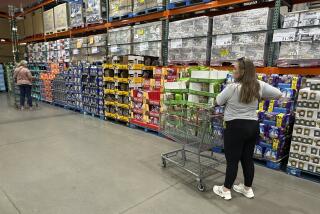Consumers Paid Down Debt Again in August : Economy: The government also reported that the sale of wholesale goods fell for the third month in a row.
- Share via
WASHINGTON — American consumers reduced their outstanding debt for the seventh consecutive month in August, improving their balance sheets by $959 million, the government said Wednesday.
Separately, sales by wholesale merchants fell in August as stocks of unsold goods piled up for the third month in a row, the Commerce Department said.
The decline in consumer debt translated into a 1.6% reduction at a seasonally adjusted annual rate, following a drop at a 1.8% rate in July, the Federal Reserve said.
Both consumers and businesses have been busy reducing huge debt burdens built up during the 1980s, and economists often cite that as one of the chief factors slowing the recovery.
But in a speech to the Rotary Club of Washington, Deputy Treasury Secretary John E. Robson said high debt levels were among a number of temporary obstacles that the economy would soon surmount.
“These are by and large transitory factors that time and the inherent adaptability of the American economy will overcome,” he said.
Economists believe that paying down consumer debt eventually will create a healthier economy, but in the meantime it means consumer spending--representing two-thirds of all economic activity--has been extremely sluggish.
Consumers unnerved by lackluster income growth and weak job markets have been paying off their debts for more than a year and may continue doing so for another year, many analysts believe.
August marked the 13th decline in credit outstanding in 16 months.
Revolving loans outstanding, which include credit cards, rose at a 2.8% annual rate in August. But automobile loans declined at a 0.2% rate and other loans fell at an 8.3% rate. The other category includes loans for mobile homes, education, boats, trailers and vacations.
The various changes left total consumer debt not secured by real estate at $720.9 billion, the lowest total since April, 1990.
Wholesale sales declined by 0.6% to a seasonally adjusted $150.78 billion in August, compared to a revised 2.4% increase in July.
Previously, the Commerce Department said July sales increased by 1%.
As sales weakened, inventories climbed in August by 0.6% to a seasonally adjusted $201.65 billion. That followed increases in unsold goods of 0.1% in July and 1.4% in June.
The buildup of inventories may cause companies to cut production later in the year until they can move goods off their shelves.
Sales were weaker for both durable and non-durable categories of goods.
Durables such as new cars slumped by 0.5% to a seasonally adjusted $74.95 billion, while sales of non-durables such as drugs and clothing decreased by 0.7% to $75.83 billion.
More to Read
Inside the business of entertainment
The Wide Shot brings you news, analysis and insights on everything from streaming wars to production — and what it all means for the future.
You may occasionally receive promotional content from the Los Angeles Times.








